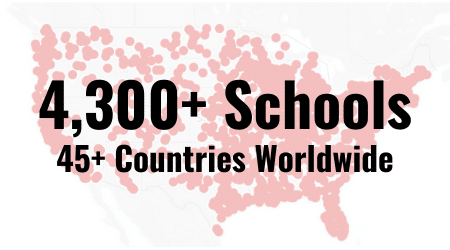The Plight of Teachers in 2014
Last fall, Microsoft asked me to share some thoughts about changes in education. Naturally, about technology. But, as I explained below, the cascading effect of technology on students will have an impact on teachers…. For the better!

“History will show that mobile technology will be the catalyst of the greatest revolution in education because it is putting the learner in the drivers’ seat.” – Susan Kruger, USA
Like many educators, Susan Kruger was inspired to help students through her own school experience. Kruger struggled to succeed in elementary school as a result of undiagnosed learning disabilities until one caring teacher took the time to provide her with tools to get better organized. She tells us “Those simple tips transformed my life by helping me see that strategy can be applied to school and learning… and makes a huge difference! That small conversation led directly to what I do today.”
And what she does today has made a big difference for countless students, teachers and parents. Kruger’s StudySkills.com provides books, kits and multimedia guides to help improve study skills and address learning difficulties like ADHD. Case studies on the site demonstrate the effectiveness of Kruger’s SOAR® Study Skills in addressing even the most challenging issues for students of all ages.
By focusing on skills – rather than content – Kruger’s methods unleash students’ innate curiosity and love of learning. “I teach students how to learn, process information, and organize,” she says. “I’m bringing relevant education to the platform; skills that students actually need to create productive and personally successful lives for themselves and our society.”
Kruger also wholeheartedly embraces technology – especially mobile technology – as a way to engage students. And she’s convinced that the instant access to information enabled by mobile devices “will quickly erode the mandated content standards that are overburdening both teachers and students.”
Kruger sees teachers becoming increasingly frustrated with their roles as “content-pushing machines,” and she believes that the shift from content focus to skills focus “will allow teachers to become facilitators and coaches in education, which is the role most teachers envisioned when they chose their profession.”
What drew you to the field of education? Why is it important to you?
I went to a Montessori school as a young child, age 2½ to 6, and I loved it! I grew up wanting to be a Montessori teacher. I don’t ever remember a time when I didn’t want to be a teacher. In retrospect, I’m absolutely sure that I loved Montessori school so much because I was allowed to explore my own interests while also learning important academic and life skills.
Can you tell us about a favorite teacher, or someone who made a difference in your education?
My specific memories of my time at Montessori are blurry since I was so young. I went on to grade school and faced serious struggles through high school due to undiagnosed learning disabilities. But, I had a teacher in third grade who took time to help me: Mrs. Turner pulled me out in the hallway one day and gave me simple tips to help me get organized at home.
Please describe how your professional achievements have advanced innovation in education. What has changed as a result of your work?
K-12 (and beyond) education standards and benchmarks are content-driven. Other than the basic skills of communication (reading/writing) and arithmetic, the vast majority of that content is never used in the workplace. Instead, students are expected to churn, not learn, information. They are pushed to be good test-takers, not good thinkers. This is tremendously harmful to students as individuals and to our society, where advancement depends on creative problem-solving. Study skills provides all learners the opportunity to be great thinkers and problem solvers.
How have you applied technology in innovative ways to support your work?
My most innovative use of technology would probably be the Multi-Media Teacher’s Guide I created for my award-winning study skills curriculum. I wanted to create a tool that would minimize work for teachers who are already over-stressed and strapped. I also wanted something that would bring study skills to life for students and help them see that these life-long skills are very dynamic. The result was an interactive, turn-key slide presentation for teachers that pulls together visuals, videos, interactive exercises and websites to help students connect study skills with the real world beyond their classroom. The slide presentation has evolved into a RIA (rich Internet application) multi-media display tool that visually guides teachers and students through the curriculum.
In your opinion, how has the use of apps, cellphones, and mobile devices changed/is changing education? And your work?
History will show that mobile technology will be the catalyst of the greatest revolution in education because it is putting the learner in the drivers’ seat. Any information a learner wants to know, at any age, is now at their finger-tips. My four year-old has been using mobile devices since she was 18 months old; she will never know a world where basic, knowledge-based questions go unanswered.
As for my work, the principles of what I teach have stayed the same and will continue to stay the same: I teach students how to access, learn, process, and organize information. In fact, these skills will become more and more significant as the sheer volume of content increases. All learners will need to know how to apply the 80/20 principle to learning – identifying the 20 percent of information that will make 80 percent of the impact.
These skills will not change, but the tools students use to implement them will. In fact, next month I’ll be doing a webinar on applying my note-taking strategies with OneNote.
In your view, what is the most exciting innovation happening in education today?
Hands down, the unilateral access to information! Students have access to information that nurtures their natural interests. Parents have access to information allowing them to make informed decisions for their children. Teachers have access to information to make their work in the classroom more dynamic.
Is there a 21st century skill (critical thinking and problem solving, communication, collaboration, or creativity and innovation) that you are most passionate about? Why?
I’m passionate about all of the above skills, but they are all secondary to the most important element of effective learning, which is the freedom of choice for the learner.
If you could give one educational tool to every child in the world, what would it be? Why?
A computer with Internet access and productivity tools. While I’m a big fan of mobile phones and notebooks/tablets, they primarily serve the purpose of accessing information. The computer, however, remains critical for producing information, tools, innovation, and more!
However, technology cannot replace good teachers who provide guidance, coaching and wisdom. Of course, students will continue to need skills and strategies for organizing and constructing knowledge into productive forms.
What is your country doing well currently to support education?
Overall, I am very critical of the United States’ approach to education, but, I will say this… our country’s inherent belief in the importance of access to education for all, regardless of socioeconomic status, gender, race, etc. is exemplary! I don’t necessarily agree with compulsory education, but I do believe in full access to those who want it and very much appreciate that our country holds this strong value towards the importance of education.
How must education change in your country to ensure that students are equipped to thrive in the 21st century?
Students must have more personal choices that serve to foster creativity and nurture their soul, instead of killing it. We must deemphasize standardized testing and the centralization of education. We can take a cue from Finland that ranks #1 in the world for education by many standards. They accomplished this ranking by decentralizing education, freeing up funds for better teacher training and giving teachers much more freedom in the classroom to connect with their students. They dramatically reduced required content and expanded choices to students.
We should be releasing teachers and students from the bondage of overwhelming content standards! Instead, we should be teaching students the self-empowering skills of learning *how* to learn and organize information. These skills would free students to explore their interests and vastly improve motivation. Teachers would no longer have to “shove” content at students. They can facilitate and coach learners as most envisioned doing when they first chose teaching as a career.
In the United States, teachers are constantly under more and more pressure to do “more with less.” The only way this spiral can reverse itself is if students are empowered to do more for themselves. The good news is, students want this challenge. Study skills give students the tools to do more with their own initiative.
What is the biggest obstacle you have had to overcome to ensure students are receiving a quality education?
As a classroom teacher, my greatest obstacle was making education relevant for students. This was hard to do because I was required to teach so much content! Students aren’t motivated unless they understand the purpose behind what we are asking them to learn. Many adults are quick to criticize students for being “under-motivated.” But, I have to ask… how many adults are motivated to do things in their job – or life – that aren’t relevant to anything?
How can teachers or school leaders facing similar challenges implement what you’ve learned through your work?
Teachers and school leaders are stuck in the same quagmire of a system as the students. Like students, teachers often feel disempowered and discouraged. My message to teachers is to make “compassion” and “relevancy” your top priorities. You’ll inspire a tremendous amount of motivation simply by communicating sincere care for students and respect for their own interests and natural talents.
The second source of powerful motivation comes from connecting new information to students’ lives and giving them tools to access that information… back to the point of making content relevant, as much as possible.
Sincerely,
Susan
EB 052317
Six Steps to
Conquer the Chaos
Get Our Free Guide & Information on...

"*" indicates required fields
SOAR® in the News
The SOAR® Curriculum
The most critical learning, organizing, and communication skills needed for school. Learn more here.
Who’s Using SOAR®?
SOAR® Guarantee
Click here to learn more.





